Heterosexuality—what is it good for? This was the question that propelled much of my reading in 2023. I started off with Jane Ward‘s indispensable The Tragedy of Heterosexuality, which traces the project of heterosexuality over time. It was surprising, but vindicating, to see just how much propaganda has been required over the centuries to convince straight men and women to like (or, rather, stand) each other. In the present day, Ward attends seduction boot camps for men and parses sexist self-help schlock to give a definitive account of twenty-first-century straight culture. The picture she paints is bleak. Insightful, resonant, and bleak.





 I followed up the Ward with more books on and adjacent to the topic of cishet womanhood: bell hooks‘s hopeful Communion, Virginie Despentes‘s scathing King Kong Theory, Amia Srinivasan‘s brilliant The Right to Sex, Susan Sontag‘s wide-ranging On Women, Carmela Ciuraru‘s delicious Lives of the Wives, and Hanna Rosin‘s eye-opening The End of Men.
I followed up the Ward with more books on and adjacent to the topic of cishet womanhood: bell hooks‘s hopeful Communion, Virginie Despentes‘s scathing King Kong Theory, Amia Srinivasan‘s brilliant The Right to Sex, Susan Sontag‘s wide-ranging On Women, Carmela Ciuraru‘s delicious Lives of the Wives, and Hanna Rosin‘s eye-opening The End of Men.


 Next, I read Ron Rosenbaum‘s misfire In Defense of Love, the title of which prompted a mentor of mine to recommend I read Laura Kipnis‘s Against Love. He assured me I would love Kipnis—he knows my tastes well—so I took him up on it. I was almost embarrassed by how right he was. Kipnis’s cheekily titled polemic should really be called Against Marriage, or perhaps Against Lifelong Monogamy, but regardless, I couldn’t put it down: a master class in voicy, witty, fearless criticism. I loved even the parts that I didn’t agree with—that’s how good and smart an essayist Kipnis is (in this book, at least; I’ve found some of her more recent writing less convincing and, worse, less amusing). Then I tore through two more of Kipnis’s books, Men and The Female Thing, both whip-smart, razor-sharp, and fascinatingly flawed at points; I loved every minute.
Next, I read Ron Rosenbaum‘s misfire In Defense of Love, the title of which prompted a mentor of mine to recommend I read Laura Kipnis‘s Against Love. He assured me I would love Kipnis—he knows my tastes well—so I took him up on it. I was almost embarrassed by how right he was. Kipnis’s cheekily titled polemic should really be called Against Marriage, or perhaps Against Lifelong Monogamy, but regardless, I couldn’t put it down: a master class in voicy, witty, fearless criticism. I loved even the parts that I didn’t agree with—that’s how good and smart an essayist Kipnis is (in this book, at least; I’ve found some of her more recent writing less convincing and, worse, less amusing). Then I tore through two more of Kipnis’s books, Men and The Female Thing, both whip-smart, razor-sharp, and fascinatingly flawed at points; I loved every minute.
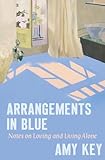
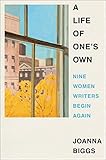 My purview later grew to include women’s loneliness—specifically the kind of loneliness that I was feeling at the time—so I read Amy Key‘s relatable Arrangements in Blue and Joanna Biggs‘s moving memoir/group biography A Life of One’s Own. Both Key and Biggs reflect on life as an unpartnered woman, and look to foremothers—for Key, Joni Mitchell; for Biggs, writers from George Eliot to Toni Morrison—for guidance.
My purview later grew to include women’s loneliness—specifically the kind of loneliness that I was feeling at the time—so I read Amy Key‘s relatable Arrangements in Blue and Joanna Biggs‘s moving memoir/group biography A Life of One’s Own. Both Key and Biggs reflect on life as an unpartnered woman, and look to foremothers—for Key, Joni Mitchell; for Biggs, writers from George Eliot to Toni Morrison—for guidance.
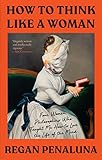




 On the whole, I mostly read books by and about women this year. Regan Penaluna‘s How to Think Like a Woman and Claire Dederer‘s Monsters were the first two books I read in 2023, each intellectually rigorous and refreshingly original in their own ways. I’m a huge admirer of Margo Jefferson, and after attending a talk of hers I read Negroland and On Michael Jackson, both of which gave me new blueprints for writing memoir and criticism, respectively. I also read Owner of a Lonely Heart, by Beth Nguyen, and Contradiction Days, by JoAnna Novak, two very different memoirs about motherhood.
On the whole, I mostly read books by and about women this year. Regan Penaluna‘s How to Think Like a Woman and Claire Dederer‘s Monsters were the first two books I read in 2023, each intellectually rigorous and refreshingly original in their own ways. I’m a huge admirer of Margo Jefferson, and after attending a talk of hers I read Negroland and On Michael Jackson, both of which gave me new blueprints for writing memoir and criticism, respectively. I also read Owner of a Lonely Heart, by Beth Nguyen, and Contradiction Days, by JoAnna Novak, two very different memoirs about motherhood.
 Later, I corrected one of my last remaining blindspots in Vivian Gornick‘s oeuvre and read The End of the Novel of Love, which ended up dovetailing nicely with my aforementioned project. Gornick is my favorite living writer, and I can’t recount my year without mentioning that I had the privilege of meeting her in April. (We ate cheeseburgers.) I had to change my lockscreen, which had been a photo of her, for the occasion.
Later, I corrected one of my last remaining blindspots in Vivian Gornick‘s oeuvre and read The End of the Novel of Love, which ended up dovetailing nicely with my aforementioned project. Gornick is my favorite living writer, and I can’t recount my year without mentioning that I had the privilege of meeting her in April. (We ate cheeseburgers.) I had to change my lockscreen, which had been a photo of her, for the occasion.

 Some other smart, funny, well-argued (and quick!) reads from this year include Phillip Maciak‘s Avidly Reads Screen Time and Ashley Shew‘s Against Technoableism. On a short-book reading kick, I also read a 100-pager on the seventeenth-century poet-nun Sor Juana Inés de la Cruz, which rather disappointed me—it would seem she can’t be contained in such a slim volume.
Some other smart, funny, well-argued (and quick!) reads from this year include Phillip Maciak‘s Avidly Reads Screen Time and Ashley Shew‘s Against Technoableism. On a short-book reading kick, I also read a 100-pager on the seventeenth-century poet-nun Sor Juana Inés de la Cruz, which rather disappointed me—it would seem she can’t be contained in such a slim volume.


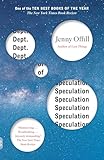 If it’s not obvious by now, my literary diet is mostly nonfiction. But I read some fiction this year, including Christine Coulson‘s clever novella One Woman Show, Lexi Friedman‘s biting (and laugh-out-loud funny) satire The Book of Ayn, and Jenny Offill‘s beguiling Dept. of Speculation.
If it’s not obvious by now, my literary diet is mostly nonfiction. But I read some fiction this year, including Christine Coulson‘s clever novella One Woman Show, Lexi Friedman‘s biting (and laugh-out-loud funny) satire The Book of Ayn, and Jenny Offill‘s beguiling Dept. of Speculation.
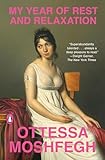

 I also started a two-person book club with my best friend, who only reads fiction. We both hated our first pick, Ottessa Moshfegh‘s My Year of Rest and Relaxation, and absolutely adored our second, Madame Bovary. We’ve just started our third book, which is one of her all-time favorites, Haruki Murakami‘s Dance Dance Dance.
I also started a two-person book club with my best friend, who only reads fiction. We both hated our first pick, Ottessa Moshfegh‘s My Year of Rest and Relaxation, and absolutely adored our second, Madame Bovary. We’ve just started our third book, which is one of her all-time favorites, Haruki Murakami‘s Dance Dance Dance.


 I’ve saved my favorite reads of the year (though I would include Ward’s Tragedy on that list too) for last: Andrew Leland‘s The Country of the Blind, Amy Sohn‘s The Man Who Hated Women, and Anna Shectman‘s (forthcoming) The Riddles of the Sphinx—an astonishing study of blindness by a writer who is himself becoming blind; an excellent chronicle of Andrew Comstock’s 19th-century tyranny and the incredible women who fought him; and a superb memoir-history about crossword puzzles and the women who’ve shaped them, respectively. The Country of the Blind is the one I find myself coming back to time and again, as a lodestar of disability writing and plain old good writing. Philosophically and intellectually rigorous, meticulously researched and reported, and beautifully written, this book is the real fucking deal. I’ve been talking about it—and recommending it to everyone I know—for the better part of this year, and I don’t see that stopping any time soon.
I’ve saved my favorite reads of the year (though I would include Ward’s Tragedy on that list too) for last: Andrew Leland‘s The Country of the Blind, Amy Sohn‘s The Man Who Hated Women, and Anna Shectman‘s (forthcoming) The Riddles of the Sphinx—an astonishing study of blindness by a writer who is himself becoming blind; an excellent chronicle of Andrew Comstock’s 19th-century tyranny and the incredible women who fought him; and a superb memoir-history about crossword puzzles and the women who’ve shaped them, respectively. The Country of the Blind is the one I find myself coming back to time and again, as a lodestar of disability writing and plain old good writing. Philosophically and intellectually rigorous, meticulously researched and reported, and beautifully written, this book is the real fucking deal. I’ve been talking about it—and recommending it to everyone I know—for the better part of this year, and I don’t see that stopping any time soon.
More from A Year in Reading 2023
A Year in Reading Archives: 2022, 2021, 2020, 2019, 2018, 2017, 2016, 2015, 2014, 2013, 2012, 2011, 2010, 2009, 2008, 2007, 2006, 2005
The post A Year in Reading: Sophia Stewart appeared first on The Millions.
Source : A Year in Reading: Sophia Stewart









